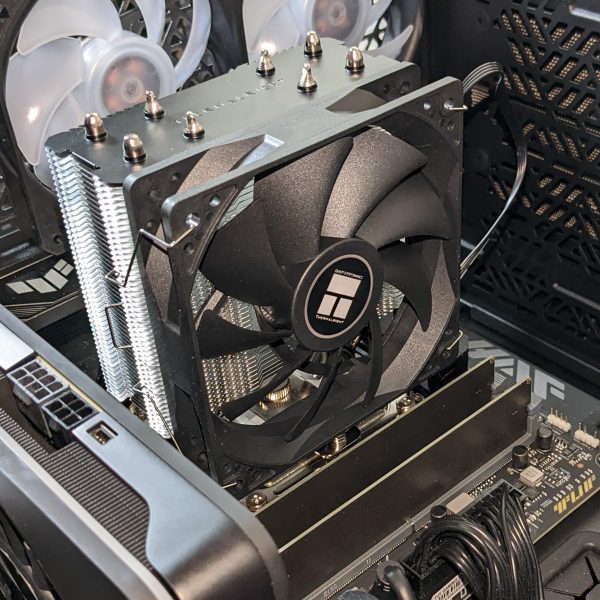With Raptor Lake’s i9-13900k consuming over 350w in some scenarios, a lot of folks – myself included (initially) – thought one would need an extremely strong cooler to handle it. I mean 350w?! That is NOT a trivial amount of heat to dissipate.
| System Components | |
| Motherboard | ASUS TUF Gaming Z690 Plus WIFI D5 |
| RAM | Crucial (Micron) DDR5-4800 |
| CPU | Intel i9-13900K |
| GPU | Intel ARC A770 LE |
| PSU | CoolerMaster XG Plus 850 Platinum |
| Case | CoolerMaster HAF700 Berserker |
Looking at it from the perspective of peak CPU temperature, it’s true that you will need a high end liquid cooler to run the hottest of workloads without thermal throttling – but I don’t think that’s the right way to look at it. Believe it or not, even the most basic of air coolers can handle the i9-13900k and provide most of the performance a high end AIO does.
| Coolers Tested | |
| Thermalright AXP120-X67 | SFF Air Cooler |
| Arctic Freezer 34 | Single Tower Air Cooler |
| Thermalright Assassin X 120 R SE | Single Tower Air Cooler |
| DeepCool AG400 | Single Tower Air Cooler |
| DeepCool AG620 | Dual Tower Air Cooler |
| DeepCool LT720 | 360mm AIO Liquid Cooler |
First, let’s look at these coolers by the amount of watts they can dissipate.

Looking at the total amount of watts each cooler can handle in Cinebench R23, you’d think that clearly you need a AIO, right? The weakest air cooler here is actually a SFF Cooler, Thermalright’s AXP120-X67, and it is cooling 107.9 watts less than the LT720 – a high end AIO. Put another way, it’s only cooling 65.8% of the watts that DeepCool’s LT720 AIO is handling. That’s a pretty big difference, right?
Actually, it’s not. Let’s take a look at overall scores next.

Looking at the scores here, there’s a gap of 5,302 points between the weakest air cooler and the high end AIO. Put another way, the SFF cooler was able to provide 86.7% of the performance of a high end AIO while running Cinebench R23. Moving up to a basic air cooler cuts the performance deficit in half, with DeepCool’s AG400 single tower air cooler providing 94.1% of the performance of the LT720 360mm AIO.

From an efficiency standpoint, Arctic’s Freezer 34 and Thermalright’s AXP120-X67 lead the pack. While other coolers outperform them in terms of total benchmark score and watts dissipated, the additional power required pushes the CPU far outside of it’s efficiency zone.
However, that doesn’t mean that using a higher end cooler is dumb, especially if you enforce a power limit. Higher end coolers won’t have to work as hard to keep something cool, so in lower wattage workloads a high end cooler will run quieter. For example, running a 200W load the LT720 AIO cooler is 0.6 dBA quieter than the AG400.
